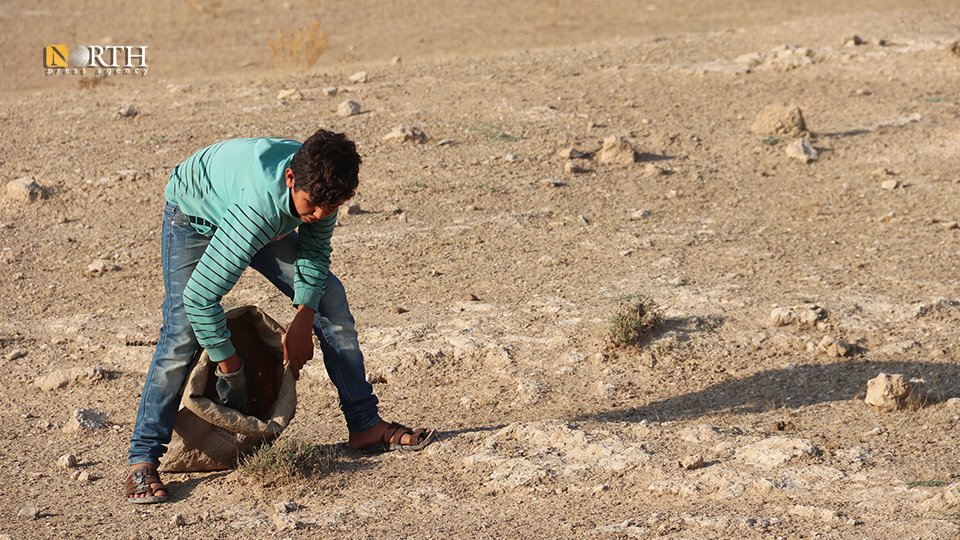IDP in Syria’s Raqqa makes living collecting wild thyme
By Ahmad Othman
RAQQA, Syria (North Press) – Every morning, Muhammad goes to the hills near his home. He leaves earlier than usual to collect more of the herb that became a source of livelihood for him.
Muhammad Abdullah, 45, an IDP from the town of Tadif in the east of Aleppo. He collects wild thyme from the hills in the Syrian Desert near the camp where he lives with his family.
Wild thyme is an herb that has a distinct smell and grows in the Mediterranean region and the Levant. It is used to flavor foods and for medicinal purposes as well.
Abdullah lives with his wife and three children in a tent built from various materials, some of which purchased by Abdullah and some donated blankets, in a makeshift camp in the village of Kasret Sheikh al-Jumaa, three kilometers south of Raqqa city in northern Syria.
Abdullah, who left his town in 2014, has been collecting wild thyme for about four years. He goes along with his son to the nearby valleys every day on his motorcycle to gather the herb, which is fully grown in July each year.
He collects up to four kilograms per day and brings it back to his tent, spreading it to dry in the sun.
Abdullah told North Press that the harvest season extends from July to November. On hot days, he goes out early to avoid the heat of the sun.
While in autumn, he struggles with the humidity which delays the drying of the herb and later its grinding.
Wild thyme grows abundantly in the Syrian Desert and is widely used by herbalists in alternative medicine to treat some health conditions and help with coughing and infections.
After Abdullah dries the harvested wild thyme, he grinds it using a primitive method by crushing it with a shovel or any other tool. Then he sifts it, removes the coarse parts and collects the plant’s seeds.
After that, he goes to the market in Raqqa, where he sells one kilogram for about 10,000 Syrian pounds (less than $1). This is his primary source of income, which enables him to provide for his family’s daily needs amid the challenging conditions faced by the majority of residents in the camp.
The dire living conditions of displacement in the camp and the challenges of finding a stable income forced him to do this. Even though he earns little for a brief period of time, it helps him secure some of his family’s need, Abdullah said.
He further explained that collecting thyme is physically demanding because of the rough terrain and the challenges involved in the collection process. Despite these difficulties, it has become his only source of income.
In his hometown, he used to own a blacksmith shop. However, due to the circumstances of displacement, aging, and health conditions, he was forced to seek a new profession. Now he waits for the season of wild thyme to collect.
After the collecting season for the wild thymes comes to an end, Abdullah will be unemployed, just like many of his peers in the 58 makeshift camps of Raqqa.
Most of the IDPs suffer from harsh living and humanitarian conditions, with limited humanitarian aid and support for winter necessities. Consequently, most of the IDPs in the makeshift camps sew their tents from cloths and burlap sacks.
During the nearly 10-year period of displacement, Abdullah and other IDPs had to search for job opportunities to support their families. Many of them now work in nearby farmlands, livestock and fodder markets due to the scarcity of jobs.
The majority of the residents in the makeshift camps of Raqqa came from the rural areas of Aleppo and Hama. These areas have been under the control of the Syrian government since 2017. Their homes were destroyed, and their properties were looted.

